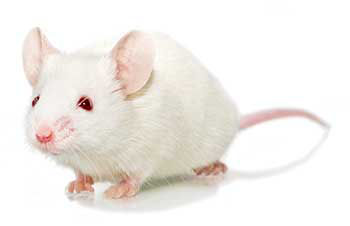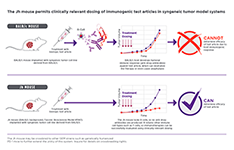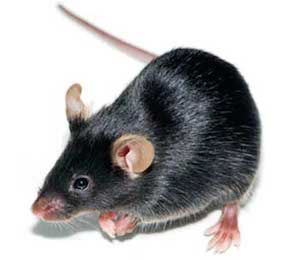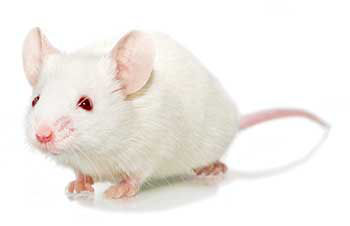Application Areas:
Jh (BALB/c)

| Model No. | Nomenclature | Genotype |
|---|---|---|
| 1147-F | C.Cg-Igh-Jtm1Dhu | ko/ko |
| 1147-M | C.Cg-Igh-Jtm1Dhu | ko/ko |
- Description
- Related Products & Services
- Price & Licensing
- Health Report
- Overview
- Genetics
- Guides & Publications
- Applications & Therapeutic Areas
- Transit, Housing & Welfare
- Diet
Overview
Nomenclature: C.Cg-Igh-Jtm1Dhu
- B cell deficient mice are useful for basic mechanistic studies of immunologic mechanisms as well as host mice in syngeneic tumor studies using immunogenic test articles.
- Carries a deletion of the endogenous murine J segments of the Ig heavy chain locus
- In homozygotes, all four JH gene segments are absent, resulting in cells that cannot produce a complete, recombined version of the variable region of the heavy chain
- Have no detectable IgM or IgG in the sera
- A low level (about 1% of normal) of rearrangement of the light chain kappa gene family is detected in total bone marrow
- Cells of the B lineage are drastically altered both in developmental progression and in cell quantity
- Contain no mature (immunoglobulin-bearing) B-lymphocytes in the spleen, bone marrow, lymph nodes, peripheral blood or peritoneum
- T-lymphocyte development appears to proceed normally, based on surface phenotype and quantity of cells in the spleen; splenic lymphocytes are enriched for T cells due to the B cell deficit
- Provides a null background useful for gene replacement experimentation in normal immune response and autoimmune diseases
- Useful for studying non-B cell activity in pathogen-induced disease and mechanisms of antibody gene assembly and expression
- For use in syngeneic experiments, the Jh mouse is 96% congenic to the BALB/c background and may successfully engraft some cell lines of BALB/c origin
- Model 17758 is a similar model on the C57BL/6NTac background which may be used for syngeneic tumor experiments using cell lines derived from B6.
- Tumor growth kinetics may vary in immunodeficient mice compared to wild type mice of the same strain. A pilot study to evaluate tumor growth is best practice.
Recommended Controls
The recommended control for this model is BALB/cAnNTac.
Origin
The Jh mouse was developed by Dennis Huszar et al. at GenPharm International. The model was created by targeting the Jh gene in AB01 embryonic stem cells derived from 129/SvEv mice and injecting the targeted cells into C57BL/6J blastocysts. Heterozygotes on a C57BL/6J background were intercrossed to generate homozygous targeted mutation mice. Yale University received stock from GenPharm in 1992. The mice were then backcrossed several generations to a C.B-Igh-1 b congenic background. The mice were then backcrossed two generations (N2) to a BALB/c inbred background and intercrossed to homozygosity. The colony is maintained through homozygous matings.
 Download the Taconic Biosciences' Infographic:
Download the Taconic Biosciences' Infographic:The Jh mouse permits clinically relevant dosing of immunogenic test articles in syngeneic tumor model systems
See how the Jh mouse can enable syngeneic tumor studies for drugs with immunogenicity problems.
Genetics
Guides & Publications
Initial Publication:
Chen J, Trounstine M, Alt FW, Young F, Kurahara C, Loring JF, Huszar D. (1993) Immunoglobulin Gene Rearrangement in B Cell Deficient Mice Generated by Targeted Deletion of the JH Locus. Int Immunol,5(6): 647-656.
Applications & Therapeutic Areas
- Autoimmune Disease
- Immunology
- Inflammation
- Oncology & Immuno-Oncology
Transit, Housing & Welfare
Need more info? Click the live chat button or Contact Us
Packing Practices
Taconic standard practice is to recombine animals of different home cages and/or ages from a single model and sex during packing, except in specific cases where Taconic's animal welfare policy prohibits recombination due to aggression or other concerns. When an order is fulfilled with animals from more than one week of birth, this standard practice results in animals from a range of birth weeks packed together in a single TTC. When an order is fulfilled with animals from genotyped models, this standard practice results in animals from different home cages packed together in a single TTC.
Customers who wish to keep animals from different weeks of birth separated should place orders with the special instruction "Divide and label by age." Note that this special request can result in increased costs for additional Taconic Transit Cages, dividers and/or freight charges.
Taconic discourages other types of custom packing requests as they can have a negative impact on animal welfare. Learn more.
Diet
- Services
- Licensing
- Pricing - USD
- Pricing - EUR
- Pricing - DKK
- Pricing - USD Nonprofit
- Pricing - EUR Nonprofit
- Pricing - DKK Nonprofit
- Select my Health Standard
- Get Custom Pricing Guide
Jh (BALB/c)
Conditions of Use for Taconic Transgenic Models™
Taconic Transgenic Models™ (Models) are produced and distributed under rights to patents and intellectual property licensed from various institutions. Taconic sells the Models to purchasers, grants to each purchaser a right under Taconic's rights in such licensed patents and intellectual property to use the purchased Model in consideration of purchasers' acknowledgement of and agreement to the Terms and Conditions for Taconic Models, Products and Services and the following terms of use:
- Title to these Models and biological materials derived from them remains with Taconic.
- The Models will be used for research purposes only.
- The Models will not be bred or cross-bred except to obtain embryos or fetuses required for research purposes unless additional rights have been granted in writing by Taconic.
- The Models and biological materials derived from them will not be distributed to third parties or used for commercial purposes.
- Non-profit purchasers may not use this Model and/or biological materials derived from it in sponsored research or contract research studies unless it is purchased at the for-profit price.
Pricing - USD
Murine Pathogen Free (MPF) Health Standard
1147 Female
1147-F Genotype ko/ko
Pilot-sized cohorts are readily available. Large cohort requests have a minimum 8-week lead time. An estimated lead time will be provided to you within 2-3 business days.
| Age in Weeks | Quantity 1 - 999 |
|---|---|
| 3 to 10 | US$232.00 |
Specialized Inventory
| 1147-RF Genotype ko/ko | Quantity 1 - 199 |
|---|---|
| retired female breeder | US$232.00 |
1147 Male
1147-M Genotype ko/ko
Cohorts are reserved upon order placement and will take 2-4 weeks to fulfill. An estimated lead time will be provided to you within 2-3 business days.
| Age in Weeks | Quantity 1 - 999 |
|---|---|
| 3 to 10 | US$232.00 |
Specialized Inventory
| 1147-RM Genotype ko/ko | Quantity 1 - 199 |
|---|---|
| retired male breeder | US$232.00 |
Pricing - EUR
Murine Pathogen Free (MPF) Health Standard
1147 Female
1147-F Genotype ko/ko
Pilot-sized cohorts are readily available. Large cohort requests have a minimum 8-week lead time. An estimated lead time will be provided to you within 2-3 business days.
| Age in Weeks | Quantity 1 - 999 |
|---|---|
| 3 to 10 | 212,00 € |
Specialized Inventory
| 1147-RF Genotype ko/ko | Quantity 1 - 199 |
|---|---|
| retired female breeder | 212,00 € |
1147 Male
1147-M Genotype ko/ko
Cohorts are reserved upon order placement and will take 2-4 weeks to fulfill. An estimated lead time will be provided to you within 2-3 business days.
| Age in Weeks | Quantity 1 - 999 |
|---|---|
| 3 to 10 | 212,00 € |
Specialized Inventory
| 1147-RM Genotype ko/ko | Quantity 1 - 199 |
|---|---|
| retired male breeder | 212,00 € |
Pricing - DKK
Murine Pathogen Free (MPF) Health Standard
1147 Female
1147-F Genotype ko/ko
Pilot-sized cohorts are readily available. Large cohort requests have a minimum 8-week lead time. An estimated lead time will be provided to you within 2-3 business days.
| Age in Weeks | Quantity 1 - 999 |
|---|---|
| 3 to 10 | kr.1.571,00 |
Specialized Inventory
| 1147-RF Genotype ko/ko | Quantity 1 - 199 |
|---|---|
| retired female breeder | kr.1.571,00 |
1147 Male
1147-M Genotype ko/ko
Cohorts are reserved upon order placement and will take 2-4 weeks to fulfill. An estimated lead time will be provided to you within 2-3 business days.
| Age in Weeks | Quantity 1 - 999 |
|---|---|
| 3 to 10 | kr.1.571,00 |
Specialized Inventory
| 1147-RM Genotype ko/ko | Quantity 1 - 199 |
|---|---|
| retired male breeder | kr.1.571,00 |
Pricing - USD Nonprofit
Murine Pathogen Free (MPF) Health Standard
1147 Female
1147-F Genotype ko/ko
Pilot-sized cohorts are readily available. Large cohort requests have a minimum 8-week lead time. An estimated lead time will be provided to you within 2-3 business days.
| Age in Weeks | Quantity 1 - 999 |
|---|---|
| 3 to 10 | US$232.00 |
Specialized Inventory
| 1147-RF Genotype ko/ko | Quantity 1 - 199 |
|---|---|
| retired female breeder | US$232.00 |
1147 Male
1147-M Genotype ko/ko
Cohorts are reserved upon order placement and will take 2-4 weeks to fulfill. An estimated lead time will be provided to you within 2-3 business days.
| Age in Weeks | Quantity 1 - 999 |
|---|---|
| 3 to 10 | US$232.00 |
Specialized Inventory
| 1147-RM Genotype ko/ko | Quantity 1 - 199 |
|---|---|
| retired male breeder | US$232.00 |
Pricing - EUR Nonprofit
Murine Pathogen Free (MPF) Health Standard
1147 Female
1147-F Genotype ko/ko
Pilot-sized cohorts are readily available. Large cohort requests have a minimum 8-week lead time. An estimated lead time will be provided to you within 2-3 business days.
| Age in Weeks | Quantity 1 - 999 |
|---|---|
| 3 to 10 | 212,00 € |
Specialized Inventory
| 1147-RF Genotype ko/ko | Quantity 1 - 199 |
|---|---|
| retired female breeder | 212,00 € |
1147 Male
1147-M Genotype ko/ko
Cohorts are reserved upon order placement and will take 2-4 weeks to fulfill. An estimated lead time will be provided to you within 2-3 business days.
| Age in Weeks | Quantity 1 - 999 |
|---|---|
| 3 to 10 | 212,00 € |
Specialized Inventory
| 1147-RM Genotype ko/ko | Quantity 1 - 199 |
|---|---|
| retired male breeder | 212,00 € |
Pricing - DKK Nonprofit
Murine Pathogen Free (MPF) Health Standard
1147 Female
1147-F Genotype ko/ko
Pilot-sized cohorts are readily available. Large cohort requests have a minimum 8-week lead time. An estimated lead time will be provided to you within 2-3 business days.
| Age in Weeks | Quantity 1 - 999 |
|---|---|
| 3 to 10 | kr.1.571,00 |
Specialized Inventory
| 1147-RF Genotype ko/ko | Quantity 1 - 199 |
|---|---|
| retired female breeder | kr.1.571,00 |
1147 Male
1147-M Genotype ko/ko
Cohorts are reserved upon order placement and will take 2-4 weeks to fulfill. An estimated lead time will be provided to you within 2-3 business days.
| Age in Weeks | Quantity 1 - 999 |
|---|---|
| 3 to 10 | kr.1.571,00 |
Specialized Inventory
| 1147-RM Genotype ko/ko | Quantity 1 - 199 |
|---|---|
| retired male breeder | kr.1.571,00 |
Select my Health Standard
Need help choosing the right Taconic Biosciences health standard for your research?
Use the Health Standard Selector to enter your exclusion list. The tool will tell you which health standards meet your requirements.
Get custom pricing guide
Schedule A Scientific Consultation
Connect directly with a member of our Scientific Solutions team who can help you select the most appropriate model and maximize your experimental success.
Related Models
Smart Select Program
Free Animal Model Trial: Quality & Compatibility Assurance
To help alleviate uncertainty in selecting a new model, we offer a free animal trial program that allows you to test the quality, consistency, and availability of Taconic’s rodent models. Pilot our most popular mouse or rat models in your facility at no cost to your organization with the Smart Select program.
- Evaluate a specific model strain, before making any financial investment
- Request up to 20 animals from one of the strains listed here to test for quality, consistency, and suitability for your experimental purpose
- Enjoy free ground shipping, where applicable (see table for more details)
















.jpg)

.jpg)
.jpg)
.jpg)
.jpg)





.jpg)


.jpg)
.jpg)




.jpg)




.jpg)

.jpg)








